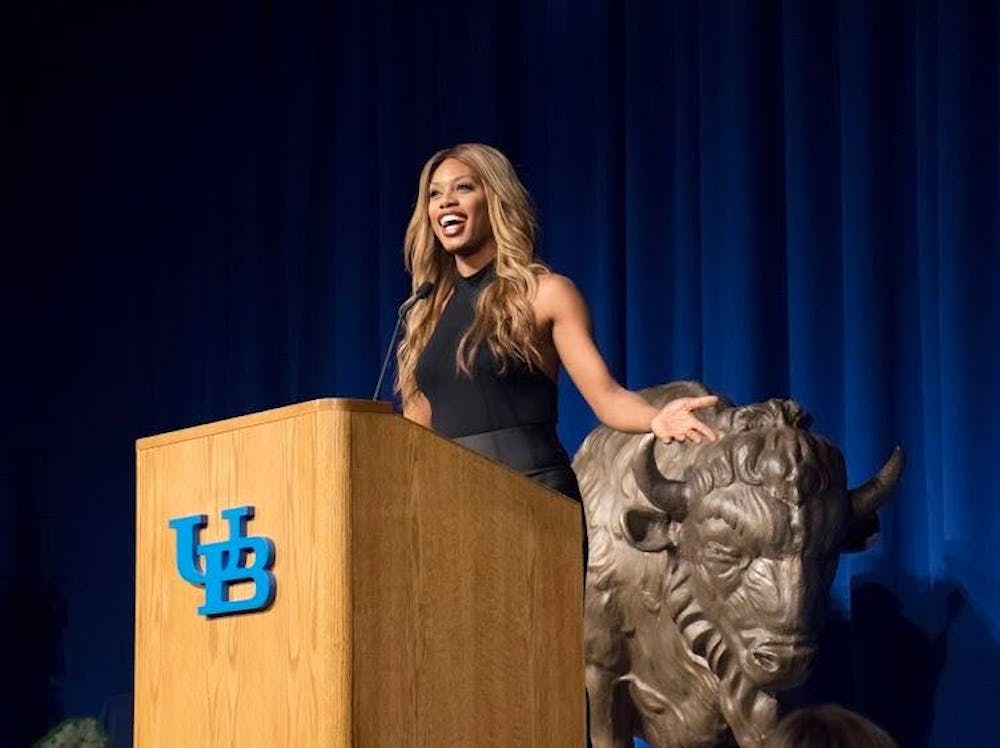Laverne Cox remembers listening to Beyoncé while walking down the street in New York City years ago. She heard someone behind her say, “That’s a man!” Moments later, the person kicked her.
Cox, a transgender activist and award-winning actress, walked confidently into Alumni Arena with her blonde locks and red lips as the first guest of the UB Distinguished Speakers Series this year. But it didn’t take long for Cox to show the audience that her appearance is just her outer layer. In an hour and 30 minutes, she disclosed her life story and explained how her upbringing helped her define her sole core. Her story left some audience laughing and others in tears.
Cox opened up by telling the audience about the oppression of transgender people in the community.
“Let’s face it, being a black working class transgender woman isn’t necessarily a celebrated class in this society,” Cox said.
She quoted Sojourner Truth’s famous saying, “Ain’t I a woman,” from the women’s liberation struggle in 1851. She also quoted Simone de Beauvoir, saying, “One is not born, but rather becomes, a woman.”
Cox then made it clear that she wasn’t always as free-spirited and self-accepting as she is now. She grew up in Alabama with her single mother and twin brother. She lived in a town where church was mandatory and “transgender” was a foreign term.
Cox remembers being chased by five or six kids while walking home from school. She was bullied and was told that she acted like a girl. Her teachers advised therapy to her mother after seeing Cox fan herself in the middle of class.
“I look back now and think what’s wrong with a kid fanning themselves thinking they’re Scarlett O’Hara? I think it’s adorable,” she said.
When she was in third grade, her therapist asked if she knew the difference between a boy and a girl. She replied with, “There isn’t one.”
But the torment didn’t end once Cox left school. She admitted her mother and grandmother weren’t very accepting. Her mother often shouted at her telling her she was a boy and she should act like one. As she grew up, she felt herself develop feelings for guys and decided to do something to get rid of the voices of her grandmother and people in the church.
The idea of growing up into a man terrified Cox. So one night, she swallowed an entire bottle pills hoping to never wake up. But she did – and with a stomach ache.
Cox said she only felt comfortable in her imagination. She loved to dance and wanted to study it after high school. Since her mother told her ballet was “too gay” as a child, her only hope for getting into Alabama School of Fine Arts was to audition as a creative writing major, take ballet classes and switch her major.
That’s exactly what she did, but was disappointed when she realized the students didn’t dance on the tables like they did in Fame.
Cox wanted to explore her femininity more and left Alabama. She transferred to Indiana University Bloomington and then to Marymount Manhattan College, where her life started to take a turn.
When she moved to New York, she felt the freedom to express herself. She “fierced up” her wardrobe and turned Salvation Army into Salvation Armani. She learned a lot about self-respect going to NYC nightclubs in the ’90s.
“For the first time in my life my gender expression was something that was valuable and I was treated very well,” she said.
Although there was a drastic change between Alabama and New York, Cox made sure she stayed focused on what she really wanted.
“I know drugs were a big thing in the club scene during that time but I’ve honestly never done a drug in my entire life,” she said.
Cox said she isn’t judgmental of people who do drugs, but knew if she wanted to live her dreams and be successful, as a working class black woman, doing illicit drugs wouldn’t get her there.
Cox then told the audience how her past has shaped who she is today. Her love for the center stage is what landed her a leading role in the Netflix series Orange is the New Black. Her adolescence in Alabama has made her appreciate people like Caitlyn Jenner, who can document their life and help young people who are experiencing the same battles.
“If I could say something to my younger self, it would be that you are not weird or different for feeling like a girl,” Cox said.
The evening ended with questions from students. One UB student stood up and with tears in his eyes, introduced himself as transgender. He asked Cox for advice on how to stay positive when family members take a person’s transition negatively.
The crowd cheered for the student and Cox replied saying, “Moments like these remind me that there is so much love in the world.”
Gabriela Julia is the senior news editor and can be reached at gabriela.julia@ubspectrum.com.





